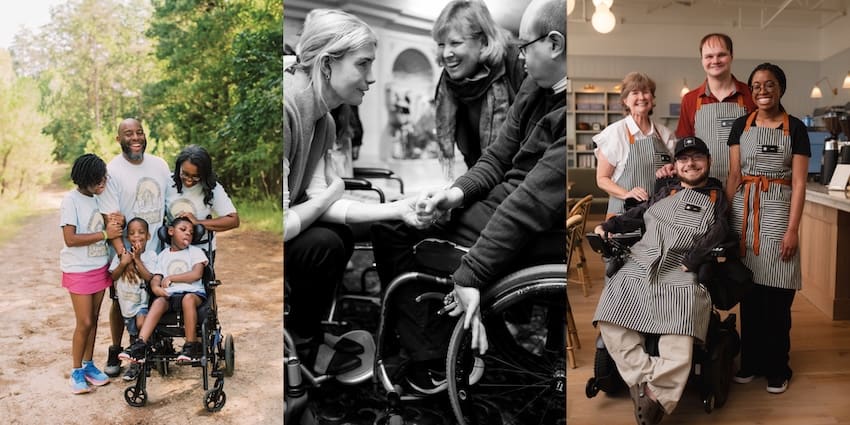Our Beneficiary


Hope Heals creates sacred spaces of belonging and belovedness for families affected by disabilities to experience sustaining hope in the context of inclusive, intentional, inter-ability communities.
Nearly 20% of people in the United States are living with a disability. This staggering statistic accounts for people with a diagnosis, but it doesn’t begin to account for the parents, siblings, caregivers and friends that also live with the ripple effects of that disability. People affected by disabilities are disproportionately vulnerable to unemployment, loneliness, and mental health crises. They’re fighting to live in a world that’s not made for them. Hope Heals is making our own version of the world made especially for them.
The story of our sacred spaces is a deeply personal one. After surviving a catastrophic stroke and acquiring life-altering disabilities herself at the age of 26, Katherine Wolf and her family unwittingly became intimately familiar with the social isolation and lack of public accessibility for people living with disabilities. Burdened to alleviate some of the loneliness for other families like their own, the Wolfs founded Hope Heals Camp, the only retreat in the world inviting entire families affected by disabilities—regardless of age, diagnosis, or location—to enjoy multi-day respite, a rich network of relationships, and access to world class resources, completely free of charge. Since 2017, Hope Heals Camp has hosted over 6,800 participants from 38 states, Canada, Europe, and Central America who live with over 150 primary diagnoses.
After witnessing the life-changing benefits of the relationships begun at the seasonal sessions of Hope Heals Camp, the Wolfs decided to undertake a perennial manifestation of this community. In 2024 they opened MEND Coffee and Goods, Atlanta’s only accessibility-first coffee shop. We’re providing dignifying employment and social enrichment to adults with disabilities, as well as a delightful hospitality experience to people of all abilities. Currently, 48% of MEND’s staff are people living with disabilities. MEND’s parent organization, Hope Heals, uses the space to facilitate opportunities for inter-ability community building like Hope Heals Hangouts and Moms at MEND.
Every sacred space we’ve built exists to disrupt the myth that joy can only be found in a pain-free life. We’re championing the belonging and belovedness of people affected by disabilities by carving out beautiful, intentional, life-giving spaces made especially for them.
Learn more about Katherine’s story: hopeheals.com/katherine
Learn more about Hope Heals Camp: hopehealscamp.org / @hopeheals.camp
Learn more about Mend Coffee: mendcoffee.com / @mendcoffee
Donate: hopeheals.com/give
